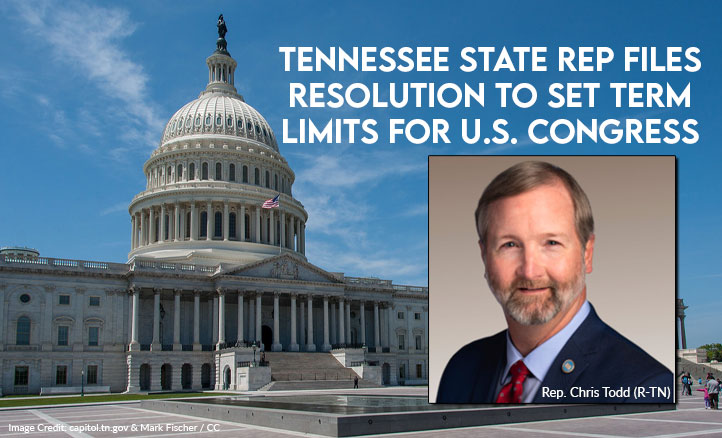Image Credit: capitol.tn.gov & Mark Fischer / CC
The Tennessee Conservative [By Jason Vaughn] –
A Republican member of the Tennessee House of Representatives has filed a resolution to propose an amendment to the United States Constitution in order to set a limit on the number of terms an individual can serve in the U.S. Congress.
Representative Chris Todd (R-Madison County-District 73) has filed House Joint Resolution 5 (HJR0005) to be considered in the 113th General Assembly.
HJR005’s summary states – A RESOLUTION to make application to the Congress of the United States pursuant to Article V of the United States Constitution to call a convention for proposing amendments to set a limit on the number of terms to which a person may be elected as a Member of the United States House of Representatives and to set a limit on the number of terms to which a person may be elected as a Member of the United States Senate.
If enacted, the resolution would authorize an application to U.S. Congress for the purpose of calling an Article V convention to propose the constitutional amendment.
Copies of the application would be sent to the President and the Secretary of the Senate of the United States, along with the Speaker and Clerk of the House of Representatives of the United State and to the members of the said Senate and House of Representatives from Tennessee, and finally to the presiding officers of each of the legislative houses in the several states, requesting their cooperation.
Todd’s resolution specifically states that the application will not be aggregated with any other applications on any other subject.

Article I, section 3 of the Constitution requires the Senate to be divided into three classes for purposes of elections.
Senators are elected to six-year terms, and every two years the members of one class—approximately one-third of the senators—face election or reelection.
Every two years, one-third of the Senate’s members are elected (or reelected). The Constitution’s framers based this three-class system on precedents established by state governments.
At the start of the first session of Congress in 1789, senators were divided into the three classes by lot with same-state senators assigned to separate groups. The term for the first class expired in two years, the second in four years, and the third in six years. Subsequent elections to all classes were for a full six-year Senate term.
Framers hoped that staggered elections would bring stability to the Senate, and in turn, to other branches of the new government. Class rotations would bring about gradual change, they argued, and prevent senators from permanently combining for “sinister purposes” while encouraging senators to deliberate measures over time.
The rotation of senators, and the fact that two thirds of its members carry over from Congress to Congress, established the idea that the Senate is a “continuing body”—unlike the House of Representatives, whose entire membership faces election every two years. Unlike the House, the Senate does not adopt a new set of rules at the start of each Congress.
Class I U.S. Senator terms expire in 2025.
Class II U.S. Senator terms expire in 2027.
Class III U.S. Senator terms expire in 2023.

Representatives run for reelection every two years, unlike U.S. Senators whose terms are six years and only run for reelection toward the end of those terms.
The Tennessee Conservative has reached out to Representative Todd with a few questions and a request for comments for this article but have not heard back yet upon publication. The article will be updated as we receive more information.


About the Author: Jason Vaughn, Media Coordinator for The Tennessee Conservative ~ Jason previously worked for a legacy publishing company based in Crossville, TN in a variety of roles through his career. Most recently, he served as Deputy Director for their flagship publication. Prior, he was a freelance journalist writing articles that appeared in the Herald Citizen, the Crossville Chronicle and The Oracle among others. He graduated from Tennessee Technological University with a Bachelor’s in English-Journalism, with minors in Broadcast Journalism and History. Contact Jason at news@TennesseeConservativeNews.com



3 Responses
We needed this a hundred years ago and might not be in the mess were in?? They will never vote this in because they will vote what is best for them and not the American people.
I’m generally in support of federal term limits. But only if they are done right. This proposed Article V application has many issues.
First, THIS application for a convention limits the discussion at the convention to term limits ONLY on members of Congress. What about term limits for the Executive Branch (e.g. the the deep state) and term limits on federal Judges? This application is too limited in scope.
Second, we should NEVER limit the terms of office for members of Congress without ALSO limiting how long a person can work in the Executive branch. Doing so would shift power away from Congress and give more power to the Executive Branch. The federal government is too large and too complex. It takes years for members of Congress to “learn the ropes” and become effective. If we allow the people who work for the Executive Branch to “serve” longer than members of Congress, the deep state will more easily run rough-shod and be able to hoodwink Members of Congress.
Third, the limited topic of the application (limited only to term limits for members of Congress) does not allow for amendments to be proposed which can help stop the “revolving door” where members of Congress are appointed to federal positions of influence and thus make a life-long career out of federal service. Imagine a member of Congress is actually term limited. An amendment which limits only their terms as members of Congress won’t stop them for working for life for the federal government in either the executive or judicial branches. My favorite term limit proposal says you can’t work for the federal government for more than x years (I like 18 years), regardless of whether your position is elected, appointed or just simply hired. I would exclude military service from counting in the years served. But such an amendment cannot be proposed at a convention under this newly proposed application which is limited to congressional term limits only.
Fourth, this application duplicates part of the Convention of States application passed on February 4, 2106. The COS application includes three topics: fiscal limits (taxes and/or spending), limits on federal jurisdiction, AND term limits for federal officials and members of Congress. (The COS application has already passed 19 states and it is expected to pass several more states in 2023. It is much further advanced down the path to calling a convention than this proposal, which would take many more years to just catch up to the COS application.). Thus the congressional term limits application being proposed here is duplicative and unnecessary.
Fifth: this application has no organized grassroots behind it. An application to call an Article V convention requires a national grassroots army — in every state — to get behind it in order for it to get through the grueling path of passing it through 34 state legislatures. This proposed application has passed in a few states but has been stagnant for several years. One key reason this application has not garnered new states in recent years is the lack of a grassroots organization getting behind it.
I commend representative Todd for pushing a topic that needs to be pushed. But I oppose this particular application based on the issues noted above.
This is all well and good. NOW how about term limits on how long a person can serve in the TN. government. How about 1 or 2 terms each. Now that is something to start with. These same people that have been in TN. gov for 20 plus years need to go home now. They are done